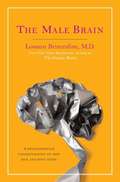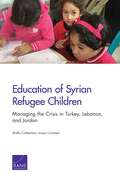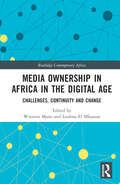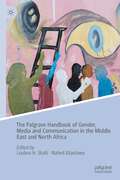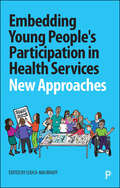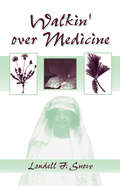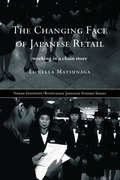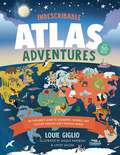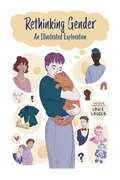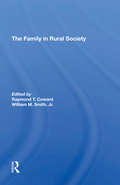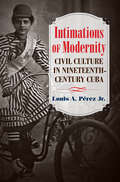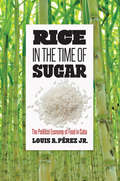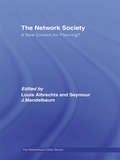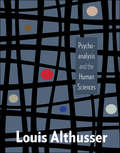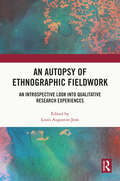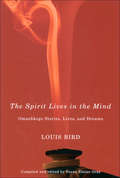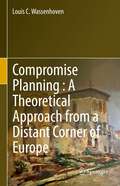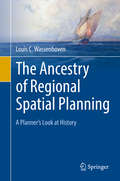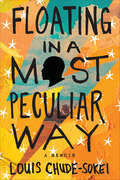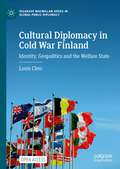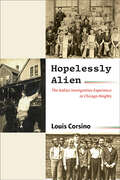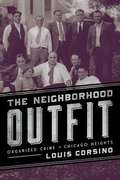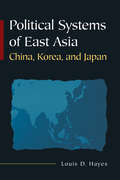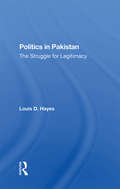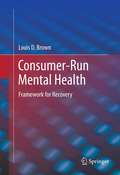- Table View
- List View
The Male Brain: A Breakthrough Understanding of How Men and Boys Think
by Louann BrizendineA breezy and enlightening guide to women and a must-read for men, this book is the eagerly awaited follow-up book that demystifies the puzzling male brain.
Education of Syrian Refugee Children
by Louay Constant Shelly CulbertsonWith four million Syrian refugees as of September 2015, there is urgent need to develop both short-term and long-term approaches to providing education for the children of this population. This report reviews Syrian refugee education for children in the three neighboring countries with the largest population of refugees--Turkey, Lebanon, and Jordan--and analyzes four areas: access, management, society, and quality.
Media Ownership in Africa in the Digital Age: Challenges, Continuity and Change (Routledge Contemporary Africa)
by Winston Mano Loubna El MkaouarWho owns the media and communications in Africa today and with what implications? The book elegantly answers this urgent question by unpacking multiple dimensions of media ownership through rare and authoritative perspectives, including both historical and contemporary digital developments. It traces the evolving forms of ownership of media and communications in specific African contexts, showing how they interact with broader changes in and outside the continent. The book also shows how Big Techs, such as Meta (formerly known as Facebook), are involved in a scramble for Africa’s digital ecosystem and how their advance brings both opportunities and concerns about ownership and control. The chapters analyse evolving forms of ownership and their implications on media concentration and democracy across Africa. The book offers a nuanced account of how media ownership structures are in some instances captured with an ever-growing and complex ecosystem that also has new opportunities for public interest media. Offering a significant representation of the trends and diversity of existing media systems, the book goes beyond the postcolonial geographical divisions of North and Sub-Saharan Africa to highlight common patterns and significant similarities and differences of communications ownerships between and within African countries. The contributors expose media and communications ownership patterns in Africa that are centralised and yet decentralising and in some cases, battling, resurging and globalising.
The Palgrave Handbook of Gender, Media and Communication in the Middle East and North Africa
by Nahed Eltantawy Loubna H. SkalliThe Palgrave Handbook of Gender, Media and Communication in the Middle East and North Africa stands as an authoritative and up-to-date resource on the critical debates, research methods and ongoing reflections on how gender and communication intersect with the economic, social, political, and cultural fabrics of the countries in the MENA region. The Handbook comprises thirty-one chapters written by both established and rising scholars of gender, media, and digital technologies, and will rely on fresh data which seeks to capture the dynamic and complex realities of MENA societies, as well as the tensions and contradictions in the politics of gender and uses of communication technologies. The Handbook is split into six sections: Gender, Identities and Sexualities; The Gender of Politics; Gender and Activism; Gender-Based Violence; Gender and Entrepreneurship; and Gender in Expressive Cultures.
Embedding Young People's Participation in Health Services: New Approaches
by Louca-Mai BradyThere is increasing interest in young people’s participation in the design and delivery of health services. But young people’s views are not consistently sought or acknowledged, and they are still often marginalised in healthcare encounters. Drawing on original research and a diverse range of practice examples, Brady explores the potential for inclusive and diverse approaches to young people’s participation in health services from the perspectives of young people, health professionals and other practitioners. She presents a practical new framework, embedded in children’s rights, that shows how young people’s participation can be integrated into services in ways that are meaningful, effective and sustainable.
Walkin’ Over Medicine: Walkin' Over Medicine
by Loudell F. SnowRepresenting over 20 years research, this text presents the results of community-based anthropological studies in Arizona and Michigan in addition to work in urban prenatal clinics, contact with traditional healers, and experience as a behavioral scientis
The Changing Face of Japanese Retail: Working in a Chain Store (Nissan Institute/Routledge Japanese Studies)
by Louella MatsunagaThis book examines employment structure, working practice and recruitment strategies in Japanese retail in the 1990s through a case-study of one large chain store. Issues focused on include gender in the workplace, changing notions of corporate community and the impact of Japan's recent recession. In particular the research presented here challenges the view of part-time female staff as peripheral to the workforce and asks whether a rethink of the Japanese employment system is now overdue.
Indescribable Atlas Adventures: An Explorer's Guide to Geography, Animals, and Cultures Through God's Amazing World (Indescribable Kids)
by Louie GiglioWith more than 50 infographic maps, this illustrated world atlas for kids from bestselling author Louie Giglio will stretch your children's understanding of the world as they discover more about God, science, and His amazing world!Indescribable Atlas Adventures offers a self-guided tour for your favorite explorer throughout the seven continents and over 50 countries. Easy-to-read maps, more than 1,500 facts, and a world map that helps kids identify each continent and country will help your child to think globally and discover new insights into God's incredible creation. Each map includesan overview of each country's population, languages, and prominent features;key facts about the country's capital cities; neighboring countries; and the national bird, tree, and dish;notable people and their amazing achievements;the country's terrain, climate, wildlife, contributions to space exploration, cultural hallmarks, and Christian faith traditions; andbiblical and inspirational pieces, like devotional thoughts, prayers, and Bible verses that highlight how amazing God and His world are.Indescribable Atlas Adventures is for ages 6 to 10 and spotlights several fascinating ecosystems, like the Sahara, Amazon, and Great Barrier Reef. This book has a large trim size to help kids explore fun details on each page and is a perfect "my first atlas of the world" gift for curious kids.Check out these other books from Pastor Louie's Indescribable Kids series, which has sold more than a million copies:IndescribableHow Great Is Our GodThe Wonder of CreationIndescribable for Little OnesIndescribable Activity Book for Kids
Rethinking Gender: An Illustrated Exploration
by Louie LäugerA lively, informative, and engaging guide to gender by an author-illustrator who helps readers understand the multiplicity of answers to &“What even is gender?&”Queer, cisgender, transgender, nonbinary, androgynous, maverique, intergender, genderfluid. Louie and their cat (a.k.a. &“Cat&”) take you on a journey through the world of gender—without claiming to have it all figured out or knowing the perfect definition for this widely complex subject. Gender is tricky to understand because it&’s a social construct intersecting with many other parts of our identity, including class, race, age, religion. For a long time, people thought of gender as binary: male/female, pirate/princess, sports/shopping. Now, we&’re starting to understand it&’s not that simple. That&’s what this book is about: figuring out what gender means, one human being at a time, and giving us new ways to let the world know who we are.Boy, girl, either/or, neither/nor, everything in between: gender is a spectrum, and it&’s hard to know where you fit, especially when your position isn&’t necessarily fixed—and the spectrum keeps expanding. That&’s where Rethinking Gender can help: it gives you a toolbox for empathy, understanding, and self-exploration. Louie&’s journey includes a deep dive into the historical context of LGBTQIA+ rights activism and the evolution of gender discourse, politics, and laws—but it also explores these ideas through the diversity of expressions and experiences of people today.In Rethinking Gender Louie offers a real-world take on what it means to be yourself, see yourself, and see someone else for who they are, too. Questions explored in Rethinking Gender include: What is cisgender? Dysphoria? Non-binary? Intersex? Intersectionality?Are sex and gender biological? Cultural? Social? Personal?What do race, religion, age, and education have to do with it?How do we recognize stereotypes, and what can we do about them?Do physical characteristics determine sex, and, if not, what does?How common is it not to fit in the box checked M or F?When is surgery or medical intervention called for, and who gets to decide?How have ideas about gender changed over time?What is gender identity, how do we know ours, and how do we talk to someone whose gender is different from our own?
The Family In Rural Society
by Raymond T Coward William M Smith Peter L Heller Louis A PlochSocial and political attention often is focused on urban issues, neglecting the still-rural character of much of the United States. This volume of original papers provides a clear picture of present-day rural society, with special emphasis on the changing role and structure of the family. It describes demographic trends, discusses the family aspects of the new wave of inmigrants to small towns and rural communities, reviews the diversity of patterns and forms adopted by rural families, considers the plight of the rural aged, and explores the dynamics of intrafamily personal relationships. The book ends with speculations on future prospects and challenges facing rural families.
Intimations of Modernity: Civil Culture in Nineteenth-Century Cuba
by Louis A. PérezLouis A. Perez Jr.'s new history of nineteenth-century Cuba chronicles in fascinating detail the emergence of an urban middle class that was imbued with new knowledge and moral systems. Fostering innovative skills and technologies, these Cubans became deeply implicated in an expanding market culture during the boom in sugar production and prior to independence. Contributing to the cultural history of capitalism in Latin America, Perez argues that such creoles were cosmopolitans with powerful transnational affinities and an abiding identification with modernity. This period of Cuban history is usually viewed through a political lens, but Perez, here emphasizing the character of everyday life within the increasingly fraught colonial system, shows how moral, social, and cultural change that resulted from market forces also contributed to conditions leading to the collapse of the Spanish colonial administration.Perez highlights women's centrality in this process, showing how criollas adapted to new modes of self-representation as a means of self-fulfillment. Increasing opportunities for middle-class women's public presence and social participation was both cause and consequence of expanding consumerism and of women's challenges to prevailing gender hierarchies. Seemingly simple actions--riding a bicycle, for example, or deploying the abanico, the fan, in different ways--exposed how traditional systems of power and privilege clashed with norms of modernity and progress.
Rice in the Time of Sugar: The Political Economy of Food in Cuba
by Louis A. PérezHow did Cuba's long-established sugar trade result in the development of an agriculture that benefited consumers abroad at the dire expense of Cubans at home? In this history of Cuba, Louis A. Perez proposes a new Cuban counterpoint: rice, a staple central to the island's cuisine, and sugar, which dominated an export economy 150 years in the making. In the dynamic between the two, dependency on food imports—a signal feature of the Cuban economy—was set in place.Cuban efforts to diversify the economy through expanded rice production were met with keen resistance by U.S. rice producers, who were as reliant on the Cuban market as sugar growers were on the U.S. market. U.S. growers prepared to retaliate by cutting the sugar quota in a struggle to control Cuban rice markets. Perez's chronicle culminates in the 1950s, a period of deepening revolutionary tensions on the island, as U.S. rice producers and their allies in Congress clashed with Cuban producers supported by the government of Fulgencio Batista. U.S. interests prevailed—a success, Perez argues, that contributed to undermining Batista's capacity to govern. Cuba's inability to develop self-sufficiency in rice production persists long after the triumph of the Cuban revolution. Cuba continues to import rice, but, in the face of the U.S. embargo, mainly from Asia. U.S. rice growers wait impatiently to recover the Cuban market.
The Network Society: A New Context for Planning (Networked Cities Series)
by Seymour J. Mandelbaum Louis AlbrechtsIn a clear and rewarding style, Albrechts and Mandelbaum consider the challenges that the new paradigm of the Network Society creates for Urban and Regional Planning. Chapters grouped into five themes discuss theoretical and practical perspectives on the contemporary organization of social, economic, cultural, political and physical spaces. These sections are: models of the Network Society the impact of physical networks such as transport challenges for Planners raised by society’s increased reliance on new technology an examination of local networks including community networks and the possibilities of setting up local networks for disaster recovery a comparison of spatial and policy networks and an exploration of the institutions involved. This book is essential reading for graduate level courses in urban studies, city and regional planning, and urban design. With its clear structure – unitary sections but a diversity of perspectives – the book can be used easily in courses such as Planning Theory, Urban Infrastructure and Public Policy.
Psychoanalysis and the Human Sciences (European Perspectives: A Series in Social Thought and Cultural Criticism)
by Louis AlthusserWhat can psychoanalysis, a psychological approach developed more than a century ago, offer us in an age of rapidly evolving, hard-to-categorize ideas of sexuality and the self? Should we abandon Freud's theories completely or adapt them to new findings and the new relationships taking shape in modern liberal societies? In a remarkably prescient series of lectures delivered in the early 1960s, the French philosopher Louis Althusser anticipated the challenges that psychoanalytic theory would face as politics moved away from structuralist frameworks and toward the elastic possibilities of anthropological and sociological thought.Psychoanalysis and the Human Sciences translates Althusser's remarkable seminars into English for the first time, making available to a wider audience the origins and potential future of radical political theory. Althusser takes the important step in these lectures of distinguishing psychoanalysis from psychology and especially psychiatry, which long resisted Freud's analytical concepts of the unconscious and overdetermination. By freeing psychoanalysis from this bind, Althusser can then apply these analytical concepts to the social and the political, integrated with Marxist theory. The result is an enlivened methodology for comprehending social organization and change that had a profound influence on the Frankfurt School and scholars who continue to work at the forefront of radical thought today: Judith Butler, Étienne Balibar, and Alain Badiou.
An Autopsy of Ethnographic Fieldwork: An Introspective Look into Qualitative Research Experiences
by Louis Augustin-JeanThis edited volume presents an international collection of fieldwork experiences from every stage of the research process with a view to normalising the process of adaptation, modification, and even failure during fieldwork when circumstances interrupt the expected outcomes.This book aims to address a gap often found in methodology books by including nine full autopsy-like reflection of fieldwork experiences, selected based on researchers’ disciplines and fields, the diversity of geographical locations and their differing themes. Its chapters record a swath of experience, from choosing the research themes and hypotheses through to academic presentations and publications, shedding light on an area academic research that is often overlooked.Documenting experience from anthropologists and sociologists to political scientists and economists, the diversity of the book’s approach and its multidisciplinary focus will interest researchers, scholars, and postgraduate students from a range of subdisciplines and levels of fieldwork experience.
Spirit Lives in the Mind
by Susan Elaine Gray Louis BirdCree spiritual beliefs revolve around the sacred places and rich landscape of the Hudson Bay lowlands. The beautiful narratives in The Spirit Lives in the Mind illuminate the meaning and value of spiritual maturity and power, the parallels between Omushkego morality and Roman Catholic teachings, and the importance of maintaining the traditional stories. Bird also offers explanations of shamanism and demonstrates how Catholicism affected Cree tradition.
Compromise Planning : A Theoretical Approach from a Distant Corner of Europe
by Louis C. WassenhovenThe purpose of the book is to elaborate a planning theory which departs from the plethora of theories which reflect the conditions of developed countries of the North-West. The empirical material of this effort is derived from a country, Greece, which sits on the edge between North-West and South-East, at the corner of Europe. No doubt, there is extensive international literature on planning theory in general from a bewildering variety of viewpoints. The interested professional or student of urban and regional planning is certainly aware of the dizzying flood of books, articles and research reports on planning theory and of their never-ending borrowing of obscure concepts from more respectable scientific disciplines, from mathematics to philosophy and from physics to economics, human geography and sociology. He or she probably observed that there is a growing interest in theoretical approaches from the viewpoint of the so-called “Global South”. The author of the present book has for many decades faced the impasse of attempting to transplant theories founded on the experience of the North-West to countries with a totally different historical, political, social and geographical background. He learned that the reality that planners face is unpredictable, patchy, and responsive to social processes, frequently of a very pedestrian nature. Planning strives to deal with private interests which planners are keen to envelop in a single “public interest”, which is extremely hard to define. The behaviour of the average citizen, far from being that of the neoclassical model of the homo economicus, is that of an individual, a kind of homo individualis, who interacts with the state and the public administration within a complex web of mutual dependence and negotiation. The state and its administrative apparatus, i.e., the key-determinants and fixers of urban and regional planning policy, bargain with this individual, offer inducements, exemptions, derogations and privileges, deviate unhesitatingly from their grand policy pronouncements, but still defend the rationality and comprehensiveness of the planning system they have legislated and operationalized. It is by and large a successful modus vivendi, but only thanks to a constant practice of compromise. Hence, the term compromise planning, which the author coined as an alternative to all the existing theoretical forms of planning. This is the sort of planning, and of the accompanying theory, with which he deals in this book. It is the outcome of experience and knowledge accumulated in a long personal journey of academic teaching in England and Greece, research, and professional involvement.
The Ancestry of Regional Spatial Planning: A Planner’s Look at History
by Louis C. WassenhovenThis book is not a historical or archaeological treatise, but rather a study in which the author looks at the past, not as a historian, but as a planner who has the ambition to unravel the early manifestations of his discipline; a discipline which did not exist as such in remote periods, but the ingredients of which were nevertheless present. The author has observed the past equipped with knowledge and understanding of what regional planning was in the second half of the twentieth century and still is. He stands in the period of the first decades after the Second World War, which were the formative years of regional planning, and looks back at bygone ages. He discusses ideas and literature from the immediate post-war period in order to examine the ancestry of regional planning through their lens. The book will attract a broad range of readers because of its approach and its wide coverage of historical periods and world regions. Although Europe is the main focus, the book contains material on all continents and all periods, the ancient world, the medieval age and the modern era. The history of Urban Planning is taught and researched widely, but the history, or pre-history, before the twentieth century, of Regional Spatial Planning is not. This book will fill that vacuum.
Floating In A Most Peculiar Way: A Memoir
by Louis Chude-SokeiThe astonishing journey of a bright, utterly displaced boy, from the short-lived African nation of Biafra, to Jamaica, to the harshest streets of Los Angeles—a searing memoir that adds fascinating depth to the coming-to-America storyThe first time Chude-Sokei realizes that he is &“first son of the first son&” of a renowned leader of the bygone African nation is in Uncle Daddy and Big Auntie&’s strict religious household in Jamaica, where he lives with other abandoned children. A visiting African has just fallen to his knees to shake him by the shoulders: &“Is this the boy? Is this him?&”Chude-Sokei&’s immersion in the politics of race and belonging across the landscape of the African diaspora takes a turn when his traumatized mother, who has her own extraordinary history as the onetime &“Jackie O of Biafra,&” finally sends for him to come live with her. In Inglewood, Los Angeles, on the eve of gangsta rap and the LA riots, it&’s as if he&’s fallen to Earth. In this world, anything alien—definitely Chude-Sokei&’s secret obsession with science fiction and David Bowie—is a danger, and his yearning to become a Black American gets deeply, sometimes absurdly, complicated. Ultimately, it is a boisterous pan-African family of honorary aunts, uncles, and cousins that becomes his secret society, teaching him the redemptive skill of navigating not just Blackness, but Blacknesses, in his America.
Cultural Diplomacy in Cold War Finland: Identity, Geopolitics and the Welfare State (Palgrave Macmillan Series in Global Public Diplomacy)
by Louis ClercThis open access book explores the organization and evolution of Finland’s Cold War cultural diplomacy (1945-1975) as the basis for a reflection on the country’s foreign relations, the link between culture and politics, small states’ autonomy during the Cold War, and the porosity of the East-West divide.The book offers a historical survey of the development of Finland’s cultural diplomacy as part of the Finnish state’s foreign activities. In its empirical parts, it focuses on archives drawn from the Finnish Ministry of Foreign Affairs and the Ministry of Education in order to explain Finland’s cultural diplomacy as the result of the country’s foreign policy orientations, interactions between domestic and foreign policy, and the expansion of state activities in the artistic, educational, and cultural sectors. Various reflections and reports on foreign cultural relations highlight the role of identity concerns, cultural relations, geopolitics and economic imperatives in the development of a specifically Finnish cultural diplomacy. Furthermore, the book focuses on specific aspects and events, considering for instance the organization and evolutions of Finland’s cultural relations with the USSR, the role of cultural treaties, academic exchanges and scientific cooperation, “cultural exports” and the marketization of culture, overlaps between cultural relations and high politics.
Hopelessly Alien: The Italian Immigration Experience in Chicago Heights (SUNY series in Italian/American Culture)
by Louis CorsinoHopelessly Alien is an in-depth study of Italian immigration to Chicago Heights, Illinois, between 1910 and 1950. Drawing upon oral histories, interviews, historical documents, and census materials, Louis Corsino examines the critical concept of hope, which most immigration studies have cast in privatized, psychological terms as the motivation to emigrate in search of a better life. This investigation offers a more contentious, sociological perspective, depicting hope as both an ideological lure to recruit and manage the "foreign element" and as a resource immigrants employed to purchase acceptance and avoid a disparaging label as a "hopelessly alien" stranger. These dialectical processes are illustrated through the Italian immigrants' pursuit of occupational mobility and homeownership, and the appropriation of their children's hopes. Each became forms of cultural capital that demonstrated a public commitment to the American ethos of "joyful striving." Each provided measures of success, but these individual pursuits came at the expense of upsetting the necessary tension between individual and communal hopes.
The Neighborhood Outfit: Organized Crime in Chicago Heights
by Louis CorsinoFrom the slot machine trust of the early 1900s to the prolific Prohibition era bootleggers allied with Al Capone, and for decades beyond, organized crime in Chicago Heights, Illinois, represented a vital component of the Chicago Outfit. Louis Corsino taps interviews, archives, government documents, and his own family's history to tell the story of the Chicago Heights "boys" and their place in the city's Italian American community in the twentieth century. Debunking the popular idea of organized crime as a uniquely Italian enterprise, Corsino delves into the social and cultural forces that contributed to illicit activities. As he shows, discrimination blocked opportunities for Italians' social mobility and the close-knit Italian communities that arose in response to such limits produced a rich supply of social capital Italians used to pursue alternative routes to success that ranged from Italian grocery stores to union organizing to, on occasion, crime.
Political Systems of East Asia: China, Korea, and Japan
by Louis D HayesThis innovative, interdisciplinary introduction to East Asian politics uses a thematic approach to describe the political development of China, Japan, and Koreas since the mid-nineteenth century and analyze the social, cultural, political, and economic features of each country. Unlike standard comparative politics texts which often lack a unifying theme and employ Western conventions of the 'state', "Political Systems of East Asia" avoids these limitations and identifies a common thread running through the histories of China, Korea, and Japan. This common thread is Confucianism, which has shaped East Asian perspectives of the universe and how it operates. The text describes and explains the ways in which each country has employed this shared tradition, and how it has affected the country's internal dynamics, responses to the outside world, and its own political development.
Politics In Pakistan: The Struggle For Legitimacy
by Louis D HayesFocusing on the problems associated with Pakistan's political development, this book identifies and evaluates the factors that have determined the effectiveness of the country's political institutions. Professor Hayes examines the relationship of Islamic values to political organization and public policy and discusses the basic features of the coun
Consumer-Run Mental Health: Framework for Recovery
by Louis D. BrownConsumer-run organizations and other types of mental health self-help are becoming increasingly popular in the public mental health system. These initiatives now outnumber traditional mental health organizations in the US (Goldstrom et al., 2006). This growth is due in large part to their low cost, devoted supporters, burgeoning evidence base, and increased acceptance by mental health professionals. International interest in these initiatives is also growing as self-help is flourishing in industrialized countries worldwide. I recently edited a special issue on mental health self-help for the American Journal of Community Psychology and we received submissions from five continents, with exciting work coming out of China, Australia, and Europe. The proposed book develops a rich theoretical model called the Role Framework, which explains how people engage in and benefit from mental health consumer-run organizations (CROs).
